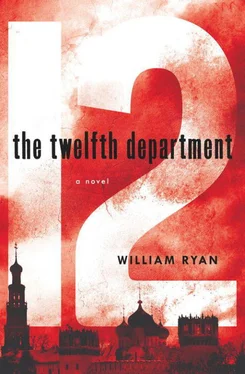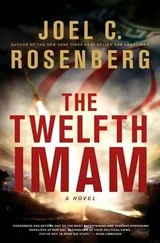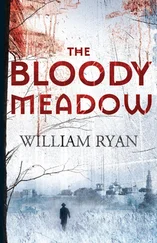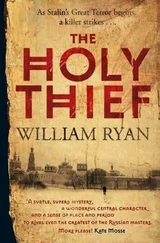Korolev ignored the question—she already knew the answer.
“Do you know whether this report was delivered to the appropriate person? Or did your husband still have it when he died?”
“I don’t know for certain. The last time I spoke to him he thought he would be home with us by the weekend—that it had been confirmed. I presumed that meant he’d delivered it.”
“May I ask what research your husband was engaged in at the institute?”
“Again, he never told me precisely. The work was secret, I know that much, and obviously he had to be very careful about what he said—especially to me. I do know he found it deeply distasteful. In Leningrad his research focused on behavioral modification and how that might be useful to State Security is something I can understand his not wanting to discuss.”
She looked toward Hubert, but the greyhound said nothing—although if Korolev wasn’t much mistaken he saw a flicker of disappointment. Perhaps the French also wanted to know what the Azarov Institute had been researching. Behavioral modification? It sounded like something Militia captains should stay well clear of; but if foreign countries were interested in the professor’s research, that might explain why the two apartments had been stripped of paperwork. It also occurred to him that if Shtange’s report exposed wrongdoing and financial irregularities at the institute then that would mean the harshest penalties for those involved, as well as for those who’d failed to protect the State. Was that why the scientists might have been killed?
“Did he tell you anything?” Korolev asked. “About the research he did there? Anything at all might be helpful?”
After all, she’d be telling Hubert soon enough, he’d no doubt of that. Another cigarette stubbed out. Another cigarette immediately lit. The golden eyes appraised him before she shook her head, as if to disagree with the question itself.
“As I understand it, there was no research—not scientific anyway. Or so Arkady said. It seemed to him that whatever was being attempted wasn’t much more than a magic trick that Azarov was trying to dress up in a white coat and call science. But what the trick was, I’ve no idea. I know Azarov had support at the highest levels, however. That was clear.”
Her eyes flicked to the left, inviting him to look in the direct of the Kremlin. It was an invitation Korolev wouldn’t be taking up any time soon. Was she suggesting Stalin himself had approved this damned institute of Azarov’s? Already there were Chekists everywhere he looked—and now Stalin? He prayed to the good Lord above that his next case, if he survived this one, had nothing to do with the Organs of State Security and certainly not with the General Secretary. A murder or an armed robbery would be fine.
He grunted and then carried on with the interview and, when all was said and done, and she’d told him all she had to tell, it seemed the only person Madame Shtange could conceive of having wanted to kill her husband had been killed the day before him.
* * *
“Is Captain Korolev here?” a voice inquired loudly, as they were finishing up. Korolev turned to see a familiar face approaching them.
“This is Lieutenant Dubinkin,” Korolev said, rising to his feet. “He’s also working on the investigation.” Korolev made the introductions and hid his surprise when Dubinkin addressed Hubert and Madame Shtange in apparently fluent French. What was more, it seemed Dubinkin and Hubert knew each other already. Korolev wondered if they shared the same profession.
“Are you from Petrovka as well?” Anna Shtange spoke in Russian and Korolev wondered if it was for his benefit.
“Another organization, Madame Shtange. One equally dedicated to uncovering your husband’s killer, of course.”
Dubinkin spoke smoothly, with an apparently sincere concern, but Anna Shtange’s reaction was to rise to her feet with something close to fury in her eyes. Korolev found himself stepping forward while giving her his warmest smile. She paused, confused, and he took the opportunity to pick his notebook up from the table and nod to Dubinkin.
“We’ve just finished, Comrade Dubinkin. I’ve informed Madame Shtange that arrangements will be made for her to view her husband’s body this afternoon.” He turned his attention back to Anna Shtange. “With luck he should be released to you before the day is out.”
Hubert placed a hand on her arm, and Korolev wondered if the Frenchman shared his concerns. Surely she wouldn’t pick a fight with a man like Dubinkin in public—important French uncle or not. She must know what kind of organization she was dealing with.
“If we have any further questions?” Korolev asked, trying to keep the conversation moving, sensing that a pause would be dangerous.
“You may contact Madame Shtange through the embassy,” Hubert said, already steering her toward the lift. “She’ll be staying with us until we can arrange her and her children’s return to France.”
Anna Shtange turned, caught Korolev’s eye and nodded.
“Thank you, Captain Korolev.”
“My pleasure, Madame Shtange. Your husband’s killer will face Soviet justice very soon, believe me.”
She gave him a weak smile, then glanced at Dubinkin.
“Good—Soviet justice is famed throughout the world,” she said, before adding after a moment’s pause, “I could wish them no worse fate.”
When they stepped outside, the heat took Korolev by the throat and then did its best to push him down feet-first into the concrete sidewalk—a strange sensation and not at all pleasant. Up above, sitting on that eyrie of a roof terrace, they’d picked up whatever small breeze was whispering its way across Moscow and, slight as it had been, it had relieved some of the swelter from the day. Down here however the heat was a presence that surrounded you—and it seemed to have got even worse in the last hour or so.
“Were you trying to protect her?” Dubinkin asked with an amused smile.
“I’d finished questioning her,” Korolev said gruffly, hoping it would be enough to keep the fellow in check. “Are you coming with me to the institute?”
He pointed to the car Morozov had provided him with, noticing that the two goons were still parked not far behind it, although now they were leaning against the car, examining them at their leisure.
“You were trying to protect her, weren’t you? My dear Korolev, she wasn’t in any danger. She’s the daughter of an important French politician, one sympathetic to us.”
“Yes, I heard that. It would have been helpful if someone had mentioned it to me earlier.”
“Didn’t I?”
“You told me she was French,” Korolev said, his attention focused on the State Security men. “No more than that.”
Dubinkin chuckled.
“You’re a surprise in many ways, Korolev. I thought you’d be some aging bull, waiting his turn to be put out to pasture—but there’s more to you than that, isn’t there?”
Korolev wasn’t that interested in what Dubinkin thought of him. If the truth were told, which it seldom was these days, Korolev was beginning to get a little tired of Dubinkin toying with him. If he wanted to find a subject for study, he should go and look into the head of one of his Chekist friends in that car. He turned to Dubinkin.
“Those two likely looking fellows—leaning against the Emka? Recognize them?”
Dubinkin didn’t bother to look.
“I saw them on the way in. I believe they are comrades, yes—if that’s your question.”
“Comrades?” Korolev considered the word for a moment or two. “From this Twelfth Department?”
“I believe so. Would you like me to go and check?”
Читать дальше












